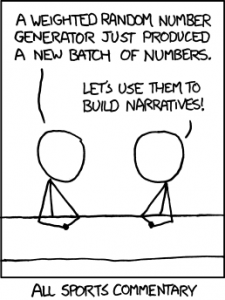 It’s a bit off-topic for the series, but I can’t even go to Google now without being reminded of the World Cup and soccer this, soccer that. (Apologies to non-Americans who know the sport as football—but don’t get me started on football!) I have often wondered: given characteristic low score values, is soccer anything more than Poisson noise? When discussing this with colleagues, one pointed me to this XKCD comic, reproduced at right.
It’s a bit off-topic for the series, but I can’t even go to Google now without being reminded of the World Cup and soccer this, soccer that. (Apologies to non-Americans who know the sport as football—but don’t get me started on football!) I have often wondered: given characteristic low score values, is soccer anything more than Poisson noise? When discussing this with colleagues, one pointed me to this XKCD comic, reproduced at right.
Any random process that produces discrete events in some time interval, with uniform probability per unit time follows a Poisson distribution. When the number of events becomes large, the distribution tends toward a Gaussian (normal) distribution.
My thesis is that soccer is an amalgam of random processes whose net effect produces rare events—those more-or-less unpredictable events spread more-or-less uniformly in time. Whether a good or bad bounce off the bar, a goal keeper who may or may not prevent a goal, a referee who may or may not see an illegal action, a pass that may or may not be intercepted, and on and on: the game is full of random, unpredictable events. So I expect soccer to behave similarly to a Poisson process and follow a Poisson distribution. By extension, I will claim that the attention devoted to the World Cup is founded on flimsy numerology and might even be called a tremendous waste of time and money.
Normally I allow comments on Do the Math for ten days after each post. I’ve tackled some controversial topics and stirred up emotional responses. Yet I predict that the outrage generated by my insinuation that watching soccer is a waste of time will absolutely dwarf the reactions to my saying that we may not be looking at a space-faring future, or that indeed we may face collapse of civilization. To the extent that this (untested) prediction is true, it would seem that soccer is more important than the fate of the world, in the eyes of many. Scary, if true. [After reconsideration, I enabled comments, but I won’t have time to vet and respond with my usual level of attention.]
But getting back to soccer numerology, my question becomes: given a final score (which is taken to be the ultimate “truth” of the match) how likely is it that the victor is actually a better team?
Views: 5229
